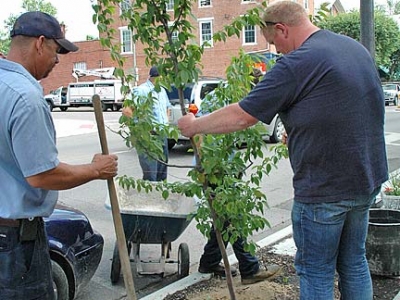No-fracking event aims to mobilize
- Published: September 8, 2011
Yellow Springs, at the epicenter of recent efforts to both lease land for oil and gas drilling and to resist it, will next week host a regional meeting of community organizers working to prevent hydraulic fracturing, a controversial drilling technique linked to groundwater contamination.
The meeting, co-sponsored by Antioch University Midwest’s new sustainability program and five statewide environmental groups, will be Sept. 10 from 10 a.m. to 2 p.m. and is aimed at moblizing organizers in 26 counties in southwest Ohio to try to stop fracking.
Oil exploration began in and around Yellow Springs last November. By Februrary, a petroleum field agent was seeking land leases from Miami Township residents to drill for oil and gas. Later that month, local organizers put on a public meeting and began going door-to-door to urge homeowners not to sign lease agreements. In April, an area resident found a binder containing what appeared to be a field agent’s guide advising them to use misleading arguments when seeking an oil and gas lease, prompting national media attention and an investigation by the Ohio attorney general. In May, Village Council passed a resolution calling on the state to put a moratorium on fracking, one month before Gov. John Kasich signed a bill opening Ohio’s state parks to drilling.
The meeting is the third regional gathering in the state to train organizers how to encourage local ordinances and resolutions, keep their neighbors from signing leases and work with local elected leaders to mount legal challenges over zoning control.
“The folks who are coming to these meetings are not coming to learn about fracking, they are concerned about it and want to take action in their communities,” said Mary Clare Rietz of Ohio Alliance for People and the Environment, one of the event’s organizers. “What happens after the meeting is more important than the meeting itself — that’s when the organizing happens.”
Yellow Springs is now one of seven municipalities in the state that have passed anti-fracking legislation. Though eastern Ohio is on the western edge of the Marsellus Shale formation purported to yield large amounts of natural gas and still at the center of recent exploration, oil companies are increasingly seeking leases elsewhere in Ohio, especially in the Utica shale formation that extends further west into the state than the Marsellus formation. Several fracking permits have already been filed with the state and a few wells have already been fracked, Rietz said.
Though no new leases have been signed in Greene or Clark counties, three lease agreements have recently been filed in Ross County to the southeast of Yellow Springs, according to Joe Cronin, director of Antioch University Midwest’s sustainability program, whose students are keeping tabs on leasing activity. Cronin said that as an educational institution, AUM is the right place for the event.
“This is something [AUM] should be doing,” he said. “We can’t just talk about it, things have to be done … we should be educating people about what’s going on and what they can do about it.”
Cronin, a philosophy professor, said he has a moral obligation to oppose fracking.
“I don’t think the purported benefits of natural gas are worth it in terms of what we’re doing to human beings, natural systems and our most precious natural resource in Ohio — our water,” Cronin said.
Organizers claim that if gas companies use fracking — a process in which water and chemicals are injected at high pressure to break up deep underground rock reservoirs so more oil and gas can be extracted — the fracking process may inadvertently contaminate underground aquifers, surface water and the air with hydrocarbons, cancer-causing chemicals and radioactive materials. While fracking is used in 90 percent of all oil and gas wells drilled today, opponents contend that it is especially dangerous when used to extract natural gas in combination with modern-day horizontal drilling, where wells are drilled at an angle to access more source rock.
Pat Gibson, vice president of West Bay Exploration, the Michigan-based oil company exploring the Yellow Springs area, said earlier this year that his company is primarily interested in oil deposited in the Yellow Springs area’s relatively shallow Trenton/Black River formation and that there would be no need to frack or drill horizontally. Initial seismic testing of underground oil along West Enon and North Fairfield Roads just north of Yellow Springs by West Bay yielded “promising” results, Gibson said, and the company has planned to return for more testing.
However, opponents of fracking say that once leases with oil and gas companies are signed, companies that say they won’t frack can change their strategy and landowners then have no power. The only way to stop fracking, according to event organizers, is grassroots action, citing moratoriums in New Jersey and New York state, and bans in such cities as Pittsburgh and Buffalo.
“We’ve seen that it requires working from the ground up,” said Vanessa Pesec, president of the Cleveland-based Network for Oil & Gas Accountability and Protection, or NEOGAP, another event organizer. “There is a lot of campaign financing and a lack of understanding from politicians about how significant and important this issue is. Until people start working locally…nothing will get changed.”
NEOGAP has been helping communities around the state assert their right to restrict drilling in the wake of a 2004 Ohio law that took away zoning control over oil and gas drilling from local communities and gave all authority to the Ohio Department of Resources’ Division of Mineral Resources Management, which now oversees oil and gas permitting and safety in the state. The result of the law, House Bill 278, was a sharp uptick in urban drilling in formerly-protected residential districts, Pesec said.
Geologists at the division maintain that the practice is safe, since no groundwater contamination has taken place in any of the 80,000 fracked vertical wells in Ohio, and strict state regulations mandate cement casing within a well to isolate underground aquifers from the fracking taking place several thousand feet below them.
“The whole key to fracturing is good casing cemented into the hole, good containment of the fracture fluids and good disposal,” said Mike McCormick, a geologist at the Division of Mineral Resources Management. To ensure safety, his division has hired additional inspectors after receiving an increase of funding through an Ohio Senate bill passed last year that levies additional fees on the oil and gas industry.
But Pesec said that the current regulations do not protect the health and safety of residents and neighbors from fracking’s effects. While the division hired a few more inspectors, she said, one-third of wells are never inspected when the cement casings are installed, the most critical phase of the process. In addition, minimum distance from the vertically-drilled well to a property that has not signed onto a drilling unit is 100 feet, provided that the well is less than 1,000 feet deep, an amount that Pesec said doesn’t take into account tank battery explosions. More serious are threats to water supplies.
“This doesn’t just affect property values,” Pesec said. “When you ruin the aquifer for an entire town, for 50 or 100 people, or develop a cancer cluster 50 years from now, that’s significant.”
Rietz and Pesec plan to eventually organize a community legal challenge to the zoning control provision of House Bill 278.
“If a local government has home rule, that government has the right to pass an ordinance protecting the health, safety and welfare of its people,” Rietz said. “The state doesn’t like it when municipalities assert their power.”
At the Sept. 10 meeting, additionally organized by the Ohio Sierra Club, Ohio Student Environmental Coalition and No Frack Ohio, five representatives from each of the 26 counties of southwest Ohio are expected. Already 24 people have registered from 11 counties in the state.
Visit http://nofrackingconferencesw.eventbrite.com for more information and to register, or contact Reitz at 513-227-1827.
The Yellow Springs News encourages respectful discussion of this article.
You must login to post a comment.
Don't have a login? Register for a free YSNews.com account.

Parkinsons.jpg)













No comments yet for this article.